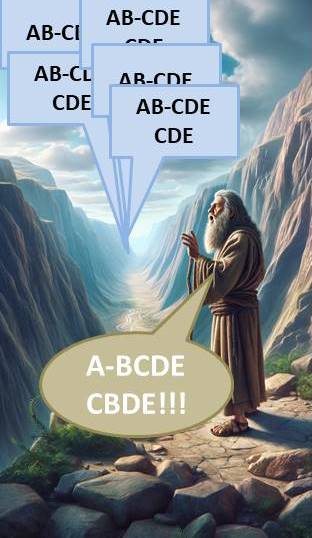I’ve been teaching an Isaiah class of late and we had an amusing time last night considering the way the New Testament Scholars have handled the quote from Isaiah 40:3 when it appears in the gospels. I don’t suppose there is some deep and dark secret meaning to all this, but I think it is always important to pay attention to details. This hones one’s own interpretation skills and gives solid Bible types something amusing to say during those long silences at Christmas parties.
So Isaiah 40:3 reads in the ESV, A voice cries: “In the wilderness prepare the way of the LORD; make straight in the desert a highway for our God.”
The point of interest for today’s discussion involves the punctuation given to what was originally an unpunctuated text.
In the original Hebrew manuscripts there were no commas, no periods, no quotation marks. Most would suggest that the Hebrew did have spaces between the words, though these were small and occasionally misread. What one had was a string of words which literally rendered went:
a voice calling in the wilderness clear a path YHWH
make straight in the desert a roadway for our God.[1]
The issue concerns the prepositional phrase “in the wilderness.”
Does this phrase modify—i.e. describe—the voice which is calling…
or does it modify the verb “clear.”
Is the voice in the wilderness crying out, or is the voice telling someone to clear a path in the wilderness?
Consider:
- (ASV) The voice of one that crieth, Prepare ye in the wilderness the way of Jehovah; make level in the desert a highway for our God. (No quotation marks, but the capital on Prepare signals the beginning of the quote. The translators put “in the wilderness” after “prepare” making the prepositional phrase adverbial, answering the question, “Where should it be prepared?”)
- (NASB) A voice is calling,“Clear the way for the Lord in the wilderness; Make smooth in the desert a highway for our God.”
- (NIV) A voice of one calling:“In the wilderness preparethe way for the Lord;make straight in the desert a highway for our God.
BUT
- (KJV) The voice of him that crieth in the wilderness, Prepare ye the way of the LORD, make straight in the desert a highway for our God. (The King James… which may prove to be the real kicker for New Testament habits—no one wants to stray too far from Good Ol’ King Jimmy lest he upset the balance of most English speaking Christians mental apple carts—attaches “in the wilderness” to the voice which is crying.)
- (LITV) The voice of him who cries in the wilderness: Prepare the way of Jehovah; make straight in the desert a highway for our God.
- (Bishops) A voyce crieth in wildernesse: Prepare the way of the Lorde, make strayght the path of our God in the desert.
- (Geneva) A voyce cryeth in the wildernesse, Prepare ye the way of the Lord: make streight in the desert a path for our God.
- (YLT) A voice is crying–in a wilderness–Prepare ye the way of Jehovah, Make straight in a desert a highway to our God.
What I find amusing is that modern LXX translations (i.e. Greek versions) agree with the King James, by placing the capital letter on the beginning of the quote at “Prepare”… and adding a quote mark… thus, attaching “in the wilderness” to the crying voice, as well.[2]
The reason for my amusement is that original Greek texts had no punctuation, were all capital letters, and had no spaces between the words.
The LXX is a rather exacting word for word rendering of the original Hebrew and there is nothing about it—well, almost nothing—that demands the punctuation or breakdown that has been followed traditionally—The voice of one crying in the wilderness, “Prepare ye the way of the Lord, make straight the paths of our God.”
Unfortunately, we find the same choices being made, not by the New Testament writers, per se, since nothing in the original manuscripts—or almost nothing—that would have demanded this punctuation or break up there either, but being made by later scholars who chose & choose to favor one rather than the other.
Even so, we find perfect agreement between, ASV, ESV, KJV, RV, NASB, NIV in Mark 1:3 (See also Matthew 3:3; Luke 3:4; John 1:23) “The voice of one crying in the wilderness: ‘Prepare the way of the Lord, make his paths straight,'”
The choice seems to reside in our attempt to find a one for one equation in the quoted passage with John’s appearance in the wilderness. John is a voice crying in the wilderness isn’t he?
Why yes, he is.
But is not John, being in the wilderness, also preparing a metaphorical path in the wilderness?
Yes, again. Great questions!
Either “a voice crying in the wilderness” or “A voice crying, “In the wilderness…” fits both the grammar and the historical context of the story… but both associations do not follow the original Hebrew.
Basic Hebrew poetry analysis tells us exactly how this line should be read. It is just as obvious in Hebrew as in English.
We have two synonymous lines of poetry.
The first is ABCDE, the 2nd is CBDE. The voice which is (A) calls “BCDE,” then “CBDE.”
(A) a voice calling (B) in the wilderness (C) clear (D) a path (E) YHWH[3]
(C) make straight (B) in the desert (D) a roadway (E) for our God.
In the 1st line we have a path being cleared in the wilderness. In the 2nd line we have a roadway being made straight in the desert.
In fact, the only reason one might decide NOT to follow the original Hebrew reading in the LXX and New Testament texts that quote it, is that the corresponding phrase “in the desert” doesn’t appear in the LXX. This means that one could say (but is not demanded to say) that the LXX version does not have “A” preaching “BCDE” then “CBDE,” but rather “AB” preaching “CDE” then “CDE” again.
Now the real question is which is original? This requires text critics to do their thing. Maybe I’ll take a stab at it in a later post.
Now… wasn’t that fun?
[1] ק֣וֹל קוֹרֵ֔א בַּמִּדְבָּ֕ר פַּנּ֖וּ דֶּ֣רֶךְ יְהוָ֑ה יַשְּׁרוּ֙ בָּעֲרָבָ֔ה מְסִלָּ֖ה לֵאלֹהֵֽינוּ
[2] For those who can read it— φωνὴ βοῶντος ἐν τῇ ἐρήμῳ Ἑτοιμάσατε τὴν ὁδὸν κυρίου, εὐθείας ποιεῖτε τὰς τρίβους τοῦ θεοῦ ἡμῶν.
[3] It is common in Hebrew to place a noun in this position without prepositions which takes on adverbial implications. So, here, YHWH sitting alone suggests “for YHWH.” We do the same thing with what we call indirect objects.
Discover more from Biblical Literacy with Dr. Andrew D. Sargent
Subscribe to get the latest posts sent to your email.



